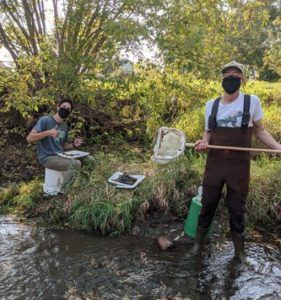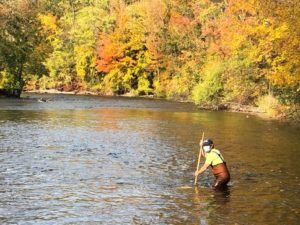The fall River Roundup was a great success thanks to a dedicated group of veteran volunteers and a little extra planning! After canceling our spring Roundup in April due to COVID-19 , we were excited to see our volunteers in the field again collecting valuable water quality data.
Attention to Safety
This year, we added more field safety protocols in response to the pandemic.

River Roundup 2020 was held entirely outdoors. Instead of having all volunteers meet inside at the beginning of the event to sign in and get instructions, staff set up drive through equipment pick-up stations in our office’s parking lot for team leaders.
Team leaders then met up with their teams at assigned field locations after picking up their gear in order to minimize the number of people interacting at one time. Field teams were smaller than usual this year, and all were required to practice physical distancing and wear masks.
Veteran volunteers only
Participation in Roundup 2020 was limited to experienced volunteers who have had previous training in our macroinvertebrate sampling methods. Without the ability to gather as one large group in the NEW Center, there was no opportunity to provide information and training materials with first-time volunteers.
Some of our veterans thought this was a great way to run the Roundup! The experienced teams were quick and efficient. But we missed meeting the next generation of water quality advocates and scientists, and HRWC is looking forward to opening our volunteer events to newcomers again when it’s safe to do so.
Lots of Great Data

54 volunteers visited 32 sampling sites and collected a whole lot of bugs! Macroinvertebrate data helps HRWC track changes in water quality overtime – Certain insects are sensitive to pollution and environmental degradation. Tracking changes in their populations helps us determine if certain creeks are experiencing changes in water quality.
No Insect ID Day this year
Due to COVID-19, HRWC will not be holding our post Roundup Insect ID Day event. Normally volunteers will come into our office to help us identify the bugs found during field collection.
This year, Watershed Ecologist Paul Steen and Associate Kate Laramie are putting in all of the microscope time, so stay tuned to find out what the bugs have to tell us about the watershed!
We look forward to having volunteer events that are open to all again. If you are interested in hearing about future volunteer opportunities, please sign up to volunteer.



